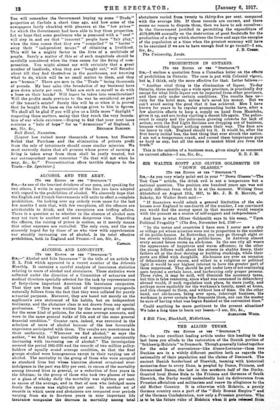ALCOHOL AND LONGEVITY.
[To rue EDITOR or THE " SPECTATOR."] Six,—" Alcohol and Life Insurance " is the title of an article by E. L. Fisk which appeared in a recent number of the Atlantic Monthly. It contains a careful analysis of insurance statistics relating to users of alcohol and abstainers. These statistics were collected under the direction of a Committee of actuaries and medical directors specially selected for the task by representatives of forty-three important American life insurance companies. That they are free from all taint of temperance propaganda naturally follows from the fact that they were collated for purely actuarial purposes. Moreover, they are based not merely on the applicant's own statement of his habits, but on independent testimony, and the abstainer class is not drawn from any special professions. " They were written by the same group of agents, for the same kind of policies, for the same average amounts, and were in the same general walks of life and of the same general financial condition." Greater care, indeed, was exercised in the selection of users of alcohol because of the less favourable experience anticipated with them. The results are monotonous in their uniformity. " Wherever we find alcohol," so says the author, " we find higher mortality and a mortality consistently increasing with increasing use of alcohol." The investigation covered the period 1885-1903 and the records of two million policy- holders of equally sound average condition, so that the final groups studied were homogeneous except in their varying use of alcohol. The mortality in the group of those who were accepted as standard lives but whose histories showed occasional over- indulgence in the past was fifty per cent. in excess of the mortality among insured lives in general, or a reduction of four years in the lifetime; in the group of those who took two glasses of beer or a glass of whisky daily the mortality was eighteen per cent. in excess of the average, and in that of men who indulged more freely tie excess was eighty-six per cent. In another set of records in which users and abstainers are compared over periods varying from six to fourteen years in nine important life Insurance companies the decrease in mortality among total abstainers varied from twenty to thirty-five per cent. compared with the average life. If these records are correct, and there seems no reason to dispute them, then we have to ask ourselves: Is the Government justified in permitting the expenditure of £170,000,000 annually on the destruction of good foodstuffs for the production of a drug which shortens the lives and saps the energies of the population at a time when the greatest economy will have to be exercised if we are to have enough food to go round P—I am,










































 Previous page
Previous page